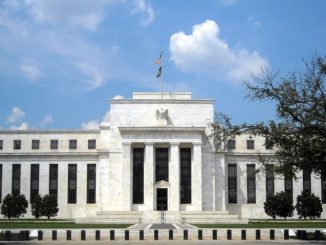
Matthew G. Bisanz [CC BY-SA]
- Like the military, central banks are creatures of the state. Suggestions of them being independent are pure fantasy.
- There is a symbiotic relationship between central banks and the state. Central banks are created by legislatures with the full understanding that they will finance the state’s spending, primarily war and welfare.
- Since the main threat to freedom comes not from foreigners but from the state itself, central banks are willing accomplices in the state’s attack on freedom.
- Central banks are the source of fiat money expansion in society. In other words, central banks create money out of thin air. We commoners call this counterfeiting. Well, so does the state if done by anyone except the central bank.
- As the source of money expansion in society, central banks are responsible for the boom-bust credit cycle. Main stream media falsely calls a central bank induced credit cycle as a business cycle, implying that it is business or free market capitalism that is to blame. Alasdair Macleod has explained in many essays why central banks and only central banks are to blame.
- Central banks are responsible for excessive state debt. In a sound money environment, state spending is limited by two factors, both of which are natural. One, the state can raise taxes to pay for new spending, but the public’s tolerance of increased taxes has a natural limit. Two, the state can borrow to pay for new spending, but it must compete for funds in the bond market to do so. Either it must outbid other borrowers and/or induce a shift in public sentiment from spending to savings. Either tactic causes the interest rate to rise. Spending falls and the cost of capital increases, causing a reduction in investment in the future prosperity of the nation. (Note that this scenario is opposite of the one touted by Keynesian economists, who view government spending as beneficial, especially when an economy goes into recession due to previous money and credit expansion by the central bank.)
- The central bank funds an almost unlimited confiscation of resources by the state. Whether to finance war or welfare, in a sound money environment the people will begin to question the options to excessive government spending. Not so when the central bank creates money out of thin air. The consequences of central bank monetization of government debt are delayed and poorly understood. When these consequences can no longer be ignored–price inflation, unemployment, never-ending war, an expanding dependent class–the state will blame others. Furthermore, it is likely to recommend even more of the same poison that caused the crisis in the first place–increase government spending to continue war beyond the public’s tolerance, to save politically connected industries like banking, or to continue to buy votes through welfare expansion.
- A corollary to number seven above is the corruption of public understanding and need for limited government. Unlimited money via the central bank makes it appear that the state can fund anything, especially in the short run. Of course, all spending programs then become short run necessities, as if the lack of government funded, free healthcare was an existential threat; whereas, healthcare is one of many economic products for which the public must make individual, rational spending choices. After all, there is no magic limit to how much is appropriate spending on healthcare. It is a subjective personal choice of each individual in society.
In conclusion, central banking is not compatible with a politically free and economically prosperous society. Through money printing the central bank empowers the state to confiscate resources beyond what the people would accept if the true state of affairs were known, as in a sound money economy. This is NOT self-government or limited government. Furthermore, central bank credit expansion causes capital decumulation. Spending becomes the goal, not savings. Individuals understand intuitively the harmful effects of excessive spending. When our personal finances are strained, we would not entertain the idea that the way to restore them would be to take long, expensive trips, buy expensive cars, etc. Of course not. We reduce our spending to well within our income. The excess of earnings over spending is savings, which is the lifeblood of any economy. So simple for the individual to understand, yet the lesson is sneered at by Keynesian economists when applied to government spending. Time for getting back to basics and away from Keynesian fantasy.
© Patrick Barron 2020 Website
The Goodnight Vienna Audio file



